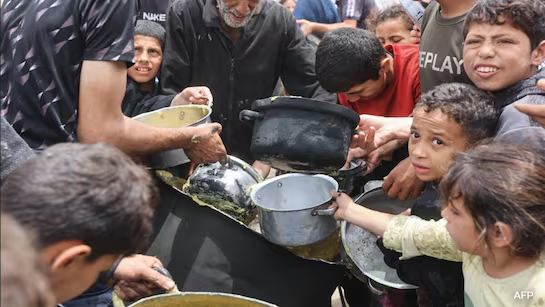A humanitarian emergency in Gaza has escalated into a political controversy after UN humanitarian chief Tom Fletcher warned that 14,000 babies could die within 48 hours if life-saving aid is not immediately delivered. The claim, made during an interview with BBC Radio 4 on 20 May 2025, prompted a swift and harsh rebuttal from the Israeli government, which described Fletcher’s remarks as “blood libel” and accused the United Nations of spreading Hamas propaganda.
What Did Fletcher Say?
Fletcher, who heads the UN Office for the Coordination of Humanitarian Affairs (OCHA), stated:
“There are 14,000 babies that will die in the next 48 hours unless we can reach them. I want to save as many of these 14,000 babies as we can in the next 48 hours.”
He stressed the need to “flood the Gaza Strip with humanitarian aid” to prevent a worsening humanitarian disaster, citing assessments from UN staff operating in medical centers and schools across Gaza.
Israeli Government Responds
The Israel Foreign Ministry condemned Fletcher’s claim, stating via its official X (formerly Twitter) account:
“When Tom Fletcher ignores Hamas’ atrocities but echoes their propaganda—it’s not humanitarian work, it’s blood libel.”
Israeli officials accused Hamas of operating from hospitals and UN schools, using civilian infrastructure to hide weapons, and hijacking aid shipments for its benefit.
They also rejected claims of genocide or war crimes, asserting that such accusations are “fabrications” not supported by facts.
What Is the Source of the 14,000 Figure?
The UN later clarified that the 14,000 babies at risk refers to projections from the Integrated Food Security Phase Classification (IPC), a global body supported by the World Health Organization, World Bank, and European Commission.
According to the IPC’s May 2025 report, Gaza faces:
-
2.2 million people in crisis or worse levels of food insecurity
-
469,500 people in catastrophic conditions
-
70,500 children under 5 projected to experience acute malnutrition
-
14,100 children expected to suffer from severe acute malnutrition over the coming year
The report emphasized that “immediate action is essential to prevent further deaths, starvation, and a descent into famine.”
UN’s Position and Humanitarian Urgency
An OCHA spokesperson said the aim is to prioritize the delivery of baby formula, nutritional supplements, and medical supplies, noting:
“We need to get the supplies in as soon as possible. We will try to reach as many as we can in the coming days.”
Although Fletcher has not commented further on the backlash, he has continued to share humanitarian updates on social media.
Context: Gaza Blockade and Aid Access
Fletcher’s warning came just after Israel announced a partial easing of its 11-week blockade, allowing a limited number of aid trucks into Gaza. However, UN agencies argue that the volume of aid is nowhere near sufficient to meet the massive needs of the population, especially infants and children at risk of starvation and disease.
Aid groups have called for:
-
Full humanitarian access
-
Protection of medical workers
-
Uninterrupted food and water supply routes
As the humanitarian crisis in Gaza continues to deepen, the debate over Fletcher’s comments highlights the urgent need for global action. Whether or not the 14,000 figure is accepted as precise, experts agree on one thing: thousands of children in Gaza are in danger, and delays in aid could cost lives.
Related stories:
UK, France, Canada Threaten Sanctions Over Israel’s Renewed Gaza Offensive
Netanyahu Announces Full-Scale Israeli Military Entry Into Gaza
Israel Approves Plan to Seize Full Control of Gaza Strip
















